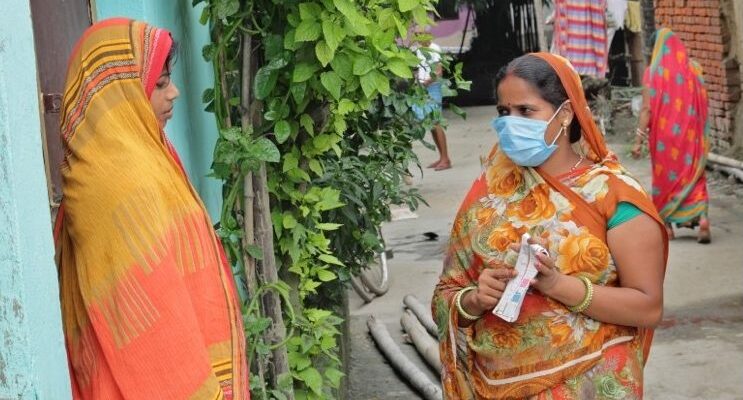
Above: Sobha goes door-to-door promoting Surya health clinics and their services.
When Sobha Kumari started as a Surya health promoter in 2009, virtually everyone one in her village disapproved of her work. Women were not allowed to talk to her. Only women with “problems” would come to her clandestinely, and they were afraid to be seen talking to her.
Much has changed in a decade. Sobha is now respected as a valuable family planning promoter in her community. Couples come to her home seeking help with family planning methods, and are not afraid of being seen with her. Sobha has become financially independent.
Sobha, 35 years old and married with three children, lives in the village of Jaduaa Bazaar in Bihar State, north eastern India. Since her husband is unemployed, she has had to depend financially on her in-laws which has stirred a great desire for independence within her.
She decided to become a community-based Surya health promoter (SHP) after the birth of her first child and was assigned to the nearby Surya clinic in Hajipur, just across the Ganges River from Patna, the capital of Bihar State. She refers a constant stream of clients to that clinic.
A key to the quality of Surya clinics is the respect and courtesy extended by the Surya clinic staff to SHPs and clients, says Sobha. For example, Surya clinics do not prescribe unnecessary medicine for pre- and post-operative services and follow-ups, unlike many hospitals in India. Surya clinics prescribe only what is absolutely necessary.
And not only does Sobha recommend Surya services, she uses them herself. Three years ago, she undertook a sterilization at a Surya clinic and was inspired by that experience. So far, she has referred 120 women for sterilization, preventing many unwanted pregnancies.
During the COVID-19 pandemic, movement in the field has been difficult. In the beginning, community members avoided interacting. But slowly she has built trust — with appropriate precautions — and people have started seeing her again, seeking advice on family planning and COVID-19. She refers clients to the Surya clinic, pointing out that the clinic maintains international norms of care, including thermal screening, social distancing, hand sanitation and personal protective equipment. Sobha herself uses a mask, hand sanitizer and social distancing when she is out in the community.
DKT Janani established the Surya Clinic Family Planning Network in 1998, and it now operates 22 Surya clinics in the states of Bihar, Jharkhand and Uttar Pradesh. Surya was the first reproductive health franchising network in India and one of the first in the world. As of mid-2020, Surya had served 34 million couples.
Surya has helped Sobha become financially independent. She now looks after her entire extended family and is building a brick house for them. Sobha has become a role model in her village and teaches women to face their challenges and, to use her words, “carve their own dignified life.”
